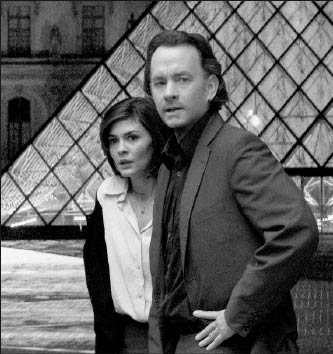Cui Bono?
by M. Faust

What, you’re actually reading this? Can you possibly need yet another review of the movie that has been variously heralded from every press and pulpit as the savior of Hollywood and the scourge of Christianity? I know The Da Vinci Code only hit theaters less than a week ago, but haven’t you had enough already?
I know I have. Because it was screened for Buffalo press too late for our deadline last week, I’ve had a chance to sample other reactions to Ron Howard’s film of Dan Brown’s megazillion copy best seller. I say “sample” in the sense that one used to “sample” cigarette smoke in a bar at two o’clock in the morning: You can try to hold your breath, but it’s getting in your lungs one way or another.
And what I found was that everyone had pretty much the same reaction as me: that the movie is by any objective standard better than the book, but that it lacks the trashy qualities that were key to the book’s appeal.
Ever the professionals, Howard and screenwriter Akiva Goldman, labored to make a silk purse from a sow’s ear, at least in storytelling terms. From Brown’s mechanical novel, they’ve fashioned a movie that looks and sounds and smells like a big-budget Hollywood thriller.
But they can only do so much. What fascinated readers (as best I can tell) about Brown’s novel were the details it compiles about two thousand years of historically supressed perfidy. Like Oliver Stone’s film JFK, it crammed all the variations of a school of conspiracy theory into one package.
Perhaps leery of being as criticized as Stone was for presenting surmise or outright fiction as accepted fact (Brown’s critics in this department are loud and vociferous), scripter Goldman strips many of the details away and leaves others in a form that will be recognized only by readers of the book. In his clumsy way, Brown gives you a checklist of items for further investigation. The film, on the other hand, is highly unlikely to send viewers away questioning the premises upon which Christianity as we know it rests.
If you’re into conspiracies, here’s one for you to consider: Could Sony Pictures and Ron Howard have intentionally made a bland, forgettable film with the purpose of defusing the whole DaVinci Code cult? As popular as the book was, the movie has already been seen by more people than will ever read it. Did Opus Dei decide that it was worth investing $125 million in a movie for the purpose of making charges against them seem ludicrous? (The O.D. operative here, a murderous, self-flagellating albino, is as cartoonish as your average movie Nazi.) Did they hire Tom Hanks and give him the worst haircut seen on a major American movie star since Harrison Ford’s “Caesar” ’do in Presumed Innocent as a way of both attracting and then repelling viewers?
You may discuss among yourselves. It’ll be more interesting than the movie, at any rate.
|
Issue Navigation> Issue Index > v5n21: The Great Wind Debate (5/25/06) > Film Reviews > Cui Bono? This Week's Issue • Artvoice Daily • Artvoice TV • Events Calendar • Classifieds |









 Current Issue
Current Issue